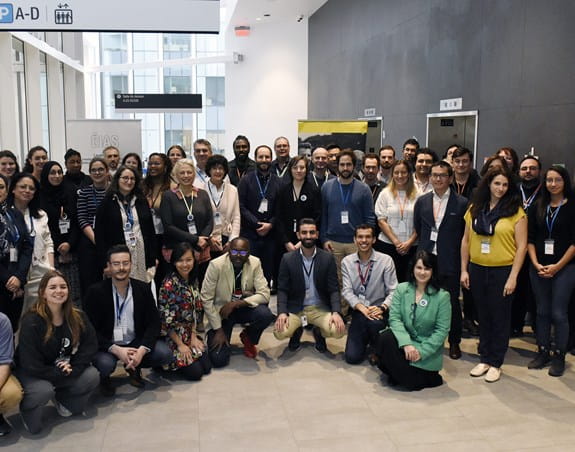[Stéphanie Thibaudeau is seated in a waiting room facing the camera.]
Stéphanie Thibaudeau: When you’re diagnosed with cancer, you obviously want to survive. You want to optimize your chances of completely irradiating the cancer.
[The image fades and the screen turns blue.]
Text on screen: Treating cancer using artificial intelligence
[Dr Tsui is standing in a hospital corridor, speaking into the camera]
Text on screen: Dr Tsui, Radiation Oncologist and Researcher at the MUHC
Dr Tsui: What can artificial intelligence do?
[Dr Tsui is seated at a computer, pointing to a pelvic x-ray image on the screen.]
It's about automatically auto-segmenting, auto-contouring, auto-drawing all of these organs.
[Dr Tsui is standing in front of camera.]
Dr Tsui: So the advantage is that instead of hours of work, it only takes a fraction of that time.
[Dr Tsui and a colleague examine X-ray sections on the computer.]
Stéphanie Thibaudeau: In my case, it’s the pelvic region.
[Stéphanie Thibaudeau, seated, facing the camera]
Text on screen: Stéphanie Thibaudeau, Patient of Dr Tsui
Stéphanie Thibaudeau: There are many organs, the intestines, the bladder. Talking to Dr Tsui really reassured me.
[Stéphanie Thibaudeau is talking to Dr Tsui in a consultation room, then faces the camera again]
Stéphanie Thibaudeau: I really trusted that the treatment plan was personalized, that we were really trying to optimize the radiation area without affecting my other organs.
[Technologists prepare a radiotherapy machine.]
Dr Tsui: So all of this frees up resources and allows us to treat more patients.
[Views of the facade of the Centre hospitalier de l’Université de Montréal followed by the reception of the Department of Radiation Oncology.]
Raphaèle Piot-Rolland: We treat around 100 patients a day in the Oncology Department alone.
[Raphaèle Piot-Rolland is seated, facing the camera]
Text on screen: Raphaèle Piot-Rolland, Vice President, Operations, Gray Oncology Solutions
Raphaèle Piot-Rolland: The solution used to be someone having to figure out this Tetris puzzle every day.
And now they can press on a button and in five minutes, it’s done, and they can adapt the program based on their knowledge...
[An employee of the Department of Radiation Oncology at the CHUM is seated in front of a computer that shows Gray's software.]
Raphaèle Piot-Rolland: We developed a program called Gray with the CHUM...
[Raphaèle Piot-Rolland speaks into the camera. The next shot shows Raphaèle sitting at her desk in front of her computer, browsing Gray's software.]
Raphaèle Piot-Rolland: ...which can automate, optimize and coordinate the care pathways of patients and, more specifically, how their appointments are managed.
[Raphaèle Piot-Rolland, seated, facing the camera]
AI can help us on two fronts.
Raphaèle Piot-Rolland: First, it allows us to optimize schedules, that is to say, optimize the use of hospital resources and reduce patient wait times.
[Two radiation oncology employees consult an appointment calendar together on Gray’s software.]
[Raphaèle Piot-Rolland, seated, facing the camera.]
Raphaèle Piot-Rolland: Second, AI can predict cancellations and patient volumes so we can make better decisions.
[Comings and goings of passers-by in a CHUM corridor.]
[The visual changes. Steve Bondu, seated, speaks into the camera.]
Text on screen: Steve Bondu, CHUM patient
Steve Bondu: The logistics here at the CHUM amaze me every day. I'm undergoing radiotherapy, so I’m able to get my treatment and then go to another floor for the appointment I have 10 minutes later.
[Two technologists help Steve Bondu lie down on the radiotherapy machine.]
Steve Bondu: They’ll say to me “Mr. Bondu, we’ve been waiting for you.” Things are hopping here, but with a logistical finesse that’s good for patients.
[Dr Bahig, seated, speaks into the camera.]
Text on screen: Dr Houda Bahig, Radiation Oncologist and Researcher at the CHUM
Dr Bahig: So the project we’re working on is one intended to individualize radiotherapy treatments for head and neck cancers.
[Steve Bondu is lying on the radiotherapy machine. He’s wearing a plastic mask from the top of his head to his neck, and beams are passing over him.]
[There are computer screens in the control room during his radiotherapy treatment.]
Dr Bahig: The goal of this project is to try to analyze the images of patients taken every day over seven weeks of treatment…
[Dr Bahig, seated, facing the camera. The next visual shows Dr Bahig during a follow-up appointment with Steve Bondu.]
Dr Bahig: and to analyze their clinical data to try to predict which patients will respond more quickly to treatments and which patients will have more serious side effects.
[Samuel Kadoury, seated, speaks into the camera.]
Text on screen: Samuel Kadoury, Professor at École polytechnique, Researcher at the CHUM
Samuel Kadoury: We’re currently training the model with more than a thousand cases. We always try to have an updated model with as much data as is available. The tool will always seek to complement the doctor’s work.
[Dr Bahig and Samuel Kadoury are seated in front of a laptop and talking as they examine x-rays.]
[Technologists finish setting Steve Bondu up on the radiotherapy machine. The video ends with Dr Bahig speaking into the camera.]
Dr Bahig: Through the discoveries it allows us to make, artificial intelligence will really be able to help us improve patient care pathways while making treatments more effective.
[The screen fades to black.]
Text on screen: AI has the potential to improve the care and lives of people with cancer.
Text on screen:
Special thanks to:
Dr James Tsui – Stéphanie Thibaudeau - Raphaèle Piot-Rolland - Steve Bondu – Dr Houda Bahig - Samuel Kadoury, Ph. D. - The Oncology and Radiation Oncology Department teams at the CHUM - The Cedars Cancer Center teams at the MUHC.
Science and Andragogy Committee of the program:
Dr An Tang - Dr Houda Bahig – Natalie Mayerhofer - Christian Blouin, patient partner at the CHUM
[The logos of the Canadian Cancer Society, the CHUM School of Artificial Intelligence in Health and the Government of Quebec appear onscreen.]


.png?h=126&w=250&hash=4C93EF730093C4F6C9C4D9AAC265500F&rev=7c7fd74c97d747e8be0eff0f1644920e)


